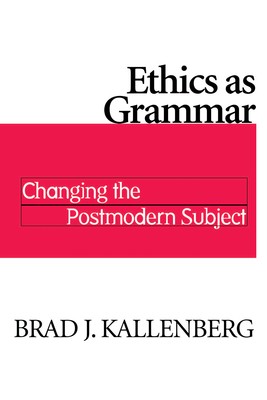
- We will send in 10–14 business days.
- Author: Brad J Kallenberg
- Publisher: University of Notre Dame Press
- ISBN-10: 0268159688
- ISBN-13: 9780268159689
- Format: 15.2 x 22.9 x 1.8 cm, minkšti viršeliai
- Language: English
- SAVE -10% with code: EXTRA
Reviews
Description
Wittgenstein, one of the most influential, and yet widely misunderstood, philosophers of our age, confronted his readers with aporias-linguistic puzzles-as a means of countering modern philosophical confusions over the nature of language without replicating the same confusions in his own writings. In Ethics as Grammar, Brad Kallenberg uses the writings of theological ethicist Stanley Hauerwas as a foil for demonstrating how Wittgenstein's method can become concrete within the Christian tradition. Kallenberg shows that the aesthetic, political, and grammatical strands epitomizing Hauerwas's thought are the result of his learning to do Christian ethics by thinking through Wittgenstein.
EXTRA 10 % discount with code: EXTRA
The promotion ends in 22d.23:30:46
The discount code is valid when purchasing from 10 €. Discounts do not stack.
- Author: Brad J Kallenberg
- Publisher: University of Notre Dame Press
- ISBN-10: 0268159688
- ISBN-13: 9780268159689
- Format: 15.2 x 22.9 x 1.8 cm, minkšti viršeliai
- Language: English English
Wittgenstein, one of the most influential, and yet widely misunderstood, philosophers of our age, confronted his readers with aporias-linguistic puzzles-as a means of countering modern philosophical confusions over the nature of language without replicating the same confusions in his own writings. In Ethics as Grammar, Brad Kallenberg uses the writings of theological ethicist Stanley Hauerwas as a foil for demonstrating how Wittgenstein's method can become concrete within the Christian tradition. Kallenberg shows that the aesthetic, political, and grammatical strands epitomizing Hauerwas's thought are the result of his learning to do Christian ethics by thinking through Wittgenstein.


Reviews